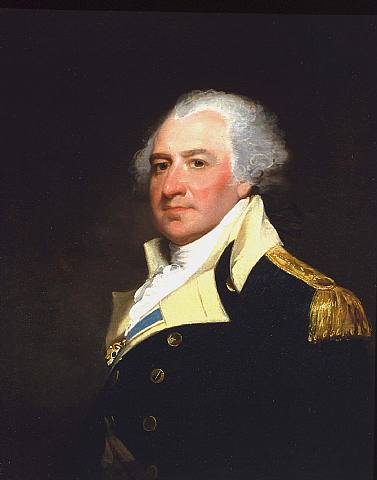
Thomas Mifflin represented the State of Pennsylvania at the Constitutional Convention. He went on to become the state’s first governor, serving from 1790 to 1799.
Early Life
Thomas Mifflin was born on January 10, 1744, in Philadelphia, Pennsylvania. His Quaker family was wealthy and well-respected. After attending local grammar schools, he attended the College of Philadelphia (now the University of Pennsylvania). He went on to become a distinguished merchant.
Mifflin entered politics in 1772, when he was elected to serve in the Pennsylvania Provincial Assembly. Two years later, Pennsylvania made him a delegate to the Continental Congress.
Revolutionary War
Mifflin supported the colonies’ quest for independence and helped organize Pennsylvania’s militia. During the Revolutionary War, he served as an aide-de-camp to General George Washington. He rose to become the Quartermaster General of the Continental Army, charged with managing the distribution of clothing and equipment to the patriot troops.
During his tenure, Mifflin was often the subject of allegations ranging from mismanagement to misconduct. After participating in the so-called Conway Cabal, which sought to remove George Washington as the head of the Continental Army, Mifflin’s relationship was Washington was greatly damaged, and he ultimately resigned his post.
Constitutional Convention
Upon returning to Philadelphia, Mifflin was again nominated to serve as a delegate to the Continental Congress. In 1783, he was elected its President and ironically was the one to receive General Washington’s resignation as Commander-in-Chief. Mifflin returned to the Pennsylvania legislature in 1784, where he served as speaker. In 1788, Mifflin was elected Pennsylvania’s president of council (akin to a modern-day governor), replacing Benjamin Franklin.
In 1787, Pennsylvania named Mifflin as one of its delegates to the Constitutional Convention. Mifflin’s greatest contributions came after the Constitution was signed. He played a significant role in Pennsylvania’s ratification effort.
Governor of Pennsylvania
In his home state, Mifflin chaired the committee that drafted the Pennsylvania constitution. In 1790, Mifflin was elected the first Governor of Pennsylvania. During his tenure, Mifflin successfully led the state out of its Revolutionary war debt. He also organized state political parties, implemented a model penal code, regulated banking, and sponsored vast public works projects.
Mifflin left office as governor in 1799. He died one year later on January 20, 1800.







